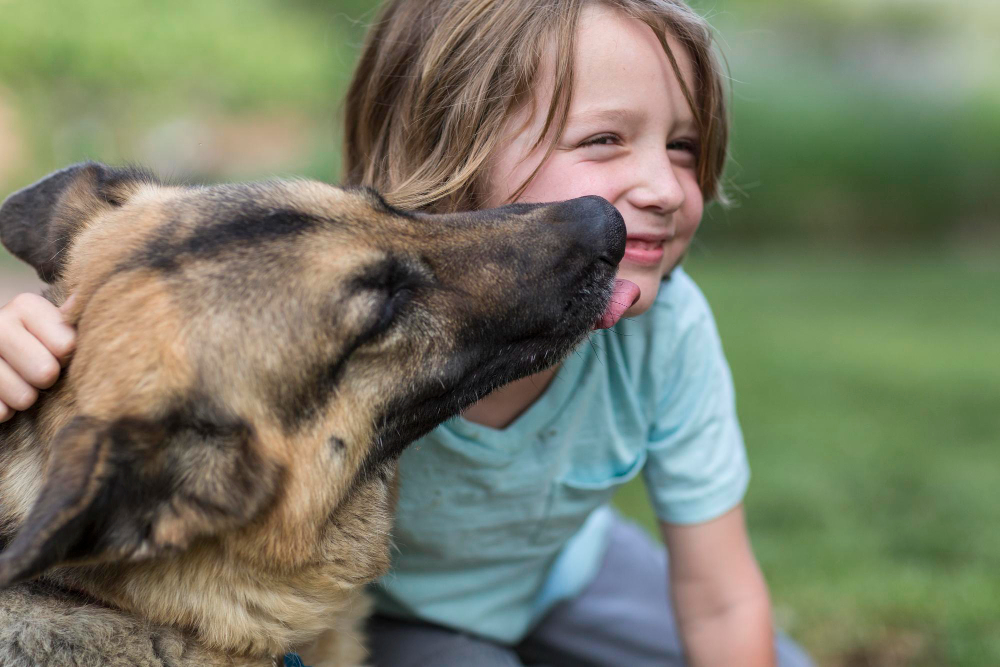We’ve all seen German Shepherd being used as police dogs in TV shows and movies, and sometimes in person as well. German Shepherds are the most common breed used by Law Enforcement. But why are German Shepherds used as police dogs rather than other breeds?
German Shepherds are used as police dogs because they have a reputation of being intelligent, highly trainable, energetic, obedient, powerful, and with a built-in sense of loyalty to their handlers.
Do you want to know why German Shepherds make such great police dogs?
What does a police dog do?
A police dog, commonly known as K9, is a dog that is specifically trained to assist police and other law-enforcement personnel.
| Do you know? The term ‘K9’ or ‘K-9’ is derived from the English and French word ‘CANINE’ (which simply means ‘DOG’). ‘CA’=’K’ and ‘NINE’=’9’ (same as ‘YOU TOO’=’U2’). … These K9 teams carry the name ‘K9 unit’. ‘K9’ is also used for dog clubs, dog kennels, dog training, commercial dog items, etc |
The duties of a police dog include:
- Finding crime scene evidence – Also known as patrol dogs, these dogs are trained and skilled in tracking, handler protection, off-leash obedience, or criminal apprehension.
- Searching for explosives or drugs (a.k.a detection) – The dogs are trained to detect explosives or drugs such as marijuana, heroin, cocaine, crack cocaine, or methamphetamines. Some dogs are specifically trained to detect firearms and ammunition.
- Apprehension and attack people targeted by police – The dogs are used to locate, apprehend, and sometimes subdue suspects.
- Search and rescue (SAR) – These dogs are trained to locate suspects or find missing people or objects after a natural disaster, wilderness tracking or mass casualty events
| Watch this true story of the special relationship between an MTA canine police officer and the dog. See how the bonding between a police dog and an MTA canine police officer has changed her life, her family’s life, and the life of the family of the late NYPD Det. Steven McDonald – longtime friends and neighbors of the Schmitts. |
The reasons why German Shepherds are used as policy dogs
1. Strength and stamina
The German Shepherd Dogs originated in Germany in the late 1800s. This breed was originally responsible for herding sheep and protecting flocks from predators. These dogs are bred for the strength to work most if not all day. They are most happy to have a job to do.
German Shepherd has double coats. That means they have an undercoat that serves as an excellent insulating coat in winter. The undercoat can help them stay warm in cold temperatures. It can also help them keep their temperature in warmer conditions. This gives German Shepherds the stamina at functioning in all sorts of different weather conditions.
2. Size and speed
The average height of GSDs ranges from 22-24 inches tall. The average weight of an adult male is 65-90 lbs, with females being smaller than males.
With this size coupled with an average running speed of 30mph, they are powerful enough to knock off a person without hesitation. In other cases, they are strong enough to grab someone’s arm or leg and hold on to it until a suspect surrenders.
3. A good pack member
Their instinctive desire for human companionship leads German Shepherds to form strong bonds with their handler.
Because of this desire and their working-dog background, most German Shepherds excel in their position as a member of the pack and seldom challenge the authority of their handler.
A well-trained police dog will attack without command in the event of an attack on its handler. Paired with a handler that matches the personality of the dog, the two can become a great team that can take the most challenging jobs.
4. Unmatched loyalty
Without a doubt, German Shepherds generally are very loyal to their owner/handler. This trait can manifest itself to let the dog become protective of its owner/handler. And they are even known to put their lives in danger to save others.
The greater the dog’s loyalty, the more eager they are to work with you. This can make a wonderful team as the dog will be able to pick up the cues from the handler’s facial expression, tone of voice, body language, and gestures.
5. Trainability
German Shepherds are one of the most intelligent dog breeds. They can learn and do almost every task you give them. In fact, German Shepherds are just very eager to work by instinct and they love to please their handler.
After all, German Shepherds are work ethics. They’re versatile dogs bred for all types of work, which means they are bred to be easy to train.
How are German Shepherds trained as police dogs?
The training of the dog
A dog usually already has anywhere from eight months to more than a year of training when he gets paired with his handler.
From there, the pair is trained together as a K-9 “team” (dog and handler), which usually is an additional three to six months of training. (Source: Northland Law Enforcement)
The youngest age when they become mature enough to concentrate on training well is between 12 and 15 months. By this time, they are mature enough to obey the commands of their handler without hesitation.
What type of training does a police dog receive?
Patrol training (which includes obedience, agility, tracking, evidence searches, open area, and building searches), and narcotics or explosives detection are the most common areas of training, although service dogs can also be trained to help find dead bodies, lost children, and the sick or elderly.
In addition, scent discrimination training is being used to help match a potential suspect to an object such as a weapon used in a crime.
In this episode of K9 Mounties, a litter of puppies is examined to see which pups display the necessary characteristics and instincts expected from a Police Dog.
The training of the handler
The other part of the training goes on with the canine handler. The handlers need to go through a process of training to ensure that they will train the dog to the best of their ability. First, the canine handler has to complete the requisite police academy training and one to two years of patrol experience before becoming eligible to transfer to a specialty canine unit.
This is because the experience as an officer allows prospective canine officers to gain valuable experience in law enforcement.
However, having dog knowledge and training outside of the police academy is considered to be an asset, this could be dog obedience, crowd control, communicating effectively with animals, and being approachable and personable since having a dog will draw attention from surrounding citizens. (Source: Wikipedia)
Final thoughts
German Shepherds are highly intelligent and trainable, and they love to work. This makes the breed well-suited for working in high-stress and sometimes even hostile situations, and it’s no surprise they’ve been used in police work for more than 100 years.
Further Questions
What other breeds of dogs are usually used for police dogs?
German Shepherd and Belgian Malinois are mostly used for police dogs. Recently, Belgium Malinois are more frequently used in police work and the military because the Malinois is smaller, more agile, has endless energy, and usually has a fearless nature.
Related: German Shepherd vs Belgium Malinios: A Quick Comparison
Do police use male or female German shepherds?
Male dogs are often picked as police dogs. They show more aggression and are stronger than female dogs. You can not say a male dog is better than a female dog. It simply matters how the canine will be assigned to work for you.
Related: Male vs Female German Shepherds: How to Choose?
Are all German Shepherd trained in German?
Some people believe that police dogs are deliberately trained in another language to mislead a suspect as he cannot understand the commands the officer gives to the dog. This is a misbelieve. Dogs imported from Europe are of course trained in their native language but that doesn’t mean it’s necessary to train a German Shepherd in German.
How many years will a police dog work for?
Generally, police departments prefer to retire dogs around 9 years old. So, the average working lifespan of a police dog is roughly 8 years, starting from the moment they are enlisted to become a K9 officer
Do police dogs get paid?
Dogs do not require a paid check. But all their expenses, food, shelter, and medical care are all provided by the department. The handler may get some additional payment to cover any incidental expenses as the dogs usually live with the handlers. However, the dog usually gets an extra treat as a reward.
More on Purebred German Shepherd

Recommended posts
- Purebred German Shepherd: What to Expect?
- How to Tell if My German Shepherd Is Purebred? 7 Fool-Proof Methods You Can Use
- Why Are German Shepherds So Popular?
- The White German Shepherd – the Ancestor of All GSDs
- 20 Amazing Facts Every German Shepherd Dog Owner Should Know
- Why Are German Shepherds More Than Just a Herding Breed? 6 Facts You May Not Know
- Why Are German Shepherds Used as Police Dogs?
German Shepherd temperament
- Do German Shepherds Have Good Temperament?
- German Shepherd Temperament: Male vs Female
- Should I Get a Purebred German Shepherd or a Mix?
- Are German Shepherds Good Family Dogs?
- Why Are German Shepherds So Loyal?
- Are German Shepherds Dangerous? Here’s What You Need to Know
- How Smart Are German Shepherds? Can They Outsmart You?
- Why Are German Shepherds So Stubborn? And What to Do About It?
- Is My German Shepherd Stubborn or Just Me?



